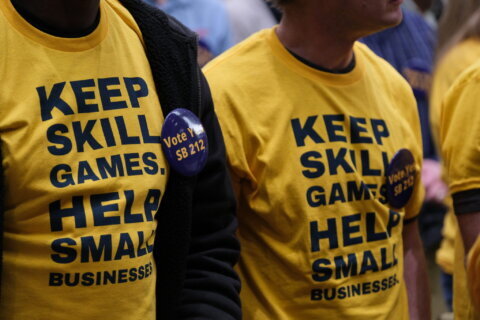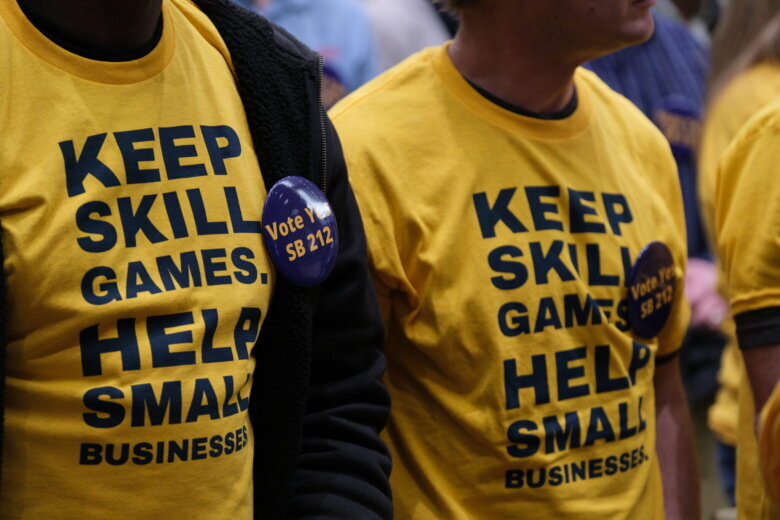This article was reprinted with permission from Virginia Mercury.

A proposal to legalize slots-like skill games in gas stations and restaurants got an initial thumbs up Monday in a Virginia Senate committee. But in an unusual move, the bill is being detoured around the Senate panel that usually deals with gambling regulation.
Lawmakers raised several concerns Monday with the proposal to lift Virginia’s ban on skill machines, asking how convenience store cashiers could be the frontline enforcers of rules meant to prevent minors and gambling addicts from playing the machines. Some pressed for more stronger transparency and oversight provisions to track how much money is going into each machine and ensure everyone involved is being treated fairly and getting their correct share of the profits.
Senators also expressed reservations about whether the Virginia Alcoholic Beverage Control Authority — which doesn’t have extensive experience overseeing gambling — could realistically set up a new system for overseeing the machines within the rapid timeframe desired by skill game supporters, who want them reactivated by July 1.
There were more questions than answers Monday as the legislation received its first hearing in the Senate Commerce and Labor Committee in a room packed with small business owners who support skill games.
The bending of legislative rules Monday to clear a more favorable path for the proposal — which is backed by a bipartisan coalition of top lawmakers in addition to the populist support from convenience store owners — highlights the intensity of the new push to get the machines turned back on after a court ruling turned them off late last year.
Several lawmakers said unresolved issues with the bill could be worked out later, but they had differing opinions on where it should go next.
Sen. Creigh Deeds, D-Charlottesville, who chairs the committee that heard the bill Monday, said the normal protocol would be for the bill to go to the Senate’s General Laws and Technology Committee, which the Senate’s rules designate as the committee responsible for “gaming and wagering.” That committee is led by Sen. Adam Ebbin, D-Alexandria, a known skill game skeptic.
“The rules of the Senate say that gaming bills go to General Laws,” Deeds said. “The chair of General Laws, Sen. Ebbin, requested the bill. And I’m going to follow the protocol of the Senate.”
But other senators overruled that decision, voting 10-5 to send the bill to the Senate Finance and Appropriations Committee. That committee is run by Sen. Louise Lucas, D-Portsmouth, a co-sponsor of the skill game bill. During Monday’s meeting, Lucas made it clear she didn’t want the General Laws committee tinkering with the proposal too much.
“I hope you all don’t fool around with this bill,” Lucas said. “Because I’d hate to have to unravel this thing when it gets to Finance.”
In an interview after the vote, Ebbin said he was disappointed his committee won’t get a chance to hear the bill and said it appeared some regulatory details of the proposal were “very hastily rushed through.”
“I don’t know what the proponents are afraid of. They seem to have friends throughout the General Assembly,” Ebbin said. “It would have been nice to have all the gaming bills considered together and compared.”
During Monday’s meeting, Sen. Bill Stanley, R-Franklin, who acknowledged he’s “biased” on skill machines after helping the industry file a lawsuit challenging Virginia’s ban, suggested too many committee hearings could bog down a “very good bill.”
“Where does it stop?” Stanley said, asking if the bill should also go to the Senate Courts of Justice Committee because it also touches on crime.
Senate Majority Leader Scott Surovell, D-Fairfax, who chairs the Courts committee, said he hadn’t asked for the bill because it takes an activity that’s currently illegal and makes it legal.
“I don’t think it’s unusual for a bill to make a couple of different pit stops,” said Surovell.
Surovell, Ebbin and Deeds all voted against the motion to bypass the Senate’s usual process for gambling bills, as did Sens. Dave Marsden, D-Fairfax, and Jeremy McPike, D-Prince William. The group of 10 senators who voted to advance the bill to the Finance committee was made up of six Republicans, including Stanley, and four Democrats who more strongly support skill games.
Presenting the bill for the first time this session, Sen. Aaron Rouse, D-Virginia Beach, told the committee that it was about sticking up for the rights of small business owners, many of them first-generation Americans, to be involved in Virginia’s newly broadened gambling industry. Though many proponents of the games insist they aren’t a form of gambling, they often point to the legalization of casinos and sports betting to argue skill machines shouldn’t be singled out in an anti-gambling crackdown.
“Virginia has opened the door to gaming,” Rouse said. “It’s time that we allow skill games to be able to compete.”
Rouse and other sponsors of the bill introduced an amended version Monday that removed a broad Freedom of Information Act exemption in the first draft that would have shielded much of the industry’s financial data from public scrutiny. Rouse said the bill’s backers are “fully supportive of a transparent reporting process.”
However, several other points of concerns were raised Monday that could be rehashed at future legislative meetings. They include:
Restrictions on minors
As drafted, the bill states that anyone under 18 cannot play the machines. Rouse said Monday that he and his allies are open to raising that age to 21 to better reflect similar rules for casinos and sports betting and win broader support for the measure.
Several lawmakers raised questions Monday about how convenience store clerks and ABC officials would enforce the age rules and supervise who’s sitting down at the machines.
“It’s a unique environment that doesn’t control entry into the building based on age,” said Marsden.
Skill game proponents have said it will fall to store clerks to enforce the age restrictions, just as they do for sales of alcohol and tobacco.
“That’s up to the establishment to make sure that doesn’t happen,” Rouse said.
Proponents of the bill have also argued that because identification is required to cash out skill game winnings, minors are unlikely to be attracted to machines that can take their money but can’t pay them.
Some critics of the industry-backed skill game bill have suggested businesses should be required to put them in a separate room with age-restricted entry.
Self-exclusion for problem gamblers
A key part of Virginia’s gambling regulations is a self-exclusion list allowing people with gambling addictions to voluntarily ban themselves from spending more money in pursuit of a jackpot.
Under questioning by senators, lobbyist Brian Moran, a former Virginia public safety secretary, acknowledged the proposal doesn’t include a way to replicate that with skill games.
“That would be a challenge,” Moran said. “I don’t know how we’d enforce that.”
Rouse noted that 2% of the tax revenues generated by the machines would be dedicated to the state’s Problem Gambling Treatment and Support Fund.
Questions about ABC’s oversight capacity
The amended bill introduced Monday directs ABC to fast-track the regulatory process to allow the machines to be reactivated by July 1, the typical date for new laws to take effect in Virginia.
The proposal envisions having skill game businesses report their own revenues, but some senators said they feel the state should have real-time data on how much money is going into each machine instead of trusting the industry to self-report its profits.
“How do we know that they’re telling us the truth?” asked Sen. Mark Peake, R-Lynchburg, who insisted he wanted to see machine data flow directly to the state “electronically.”
Skill game backers assured the committee the machines are equipped with technology to make that possible if policymakers choose the real-time data route.
John Daniel, ABC’s government affairs officer and general counsel, told senators the agency doesn’t have a position on the bill but stands ready to take on skill game regulation if the General Assembly chooses to add that to its regulatory duties for stores and restaurants that serve alcohol.
“I think we would be successful,” Daniel said.
McPike seemed skeptical of ABC’s claims it could quickly set up whatever regulatory structure lawmakers approve using only the 6% of skill game tax revenue allotted to the agency under the bill. It took the Virginia Lottery 18 months, he said, to set up the infrastructure for real-time oversight of wagering happening in the state’s casinos.
McPike said that and other issues could be addressed by sending the bill to General Laws, the committee that’s spent the most time delving into the finer points of gambling regulation. The issues senators raised Monday, he said, “are not resolved in this bill.”








